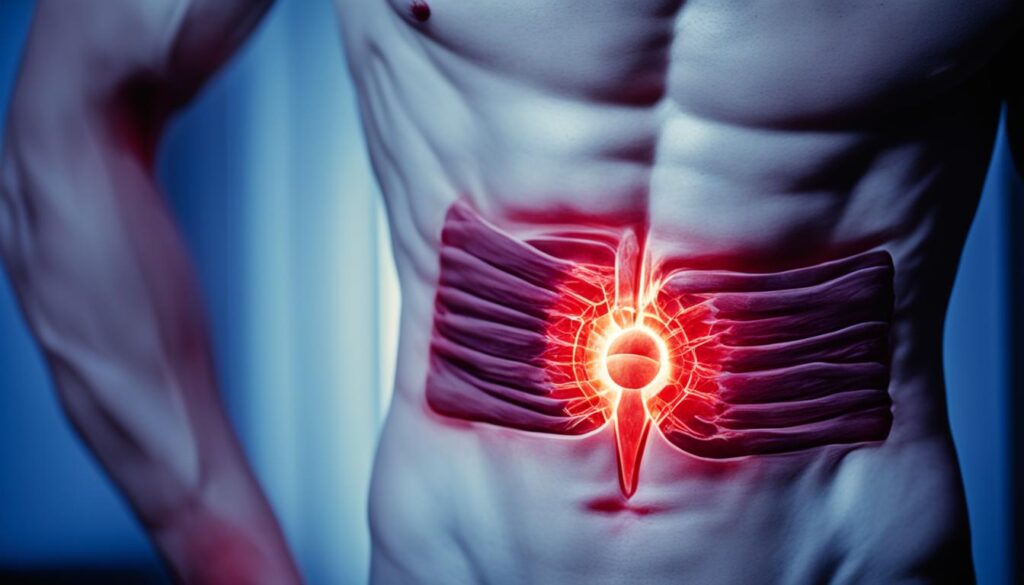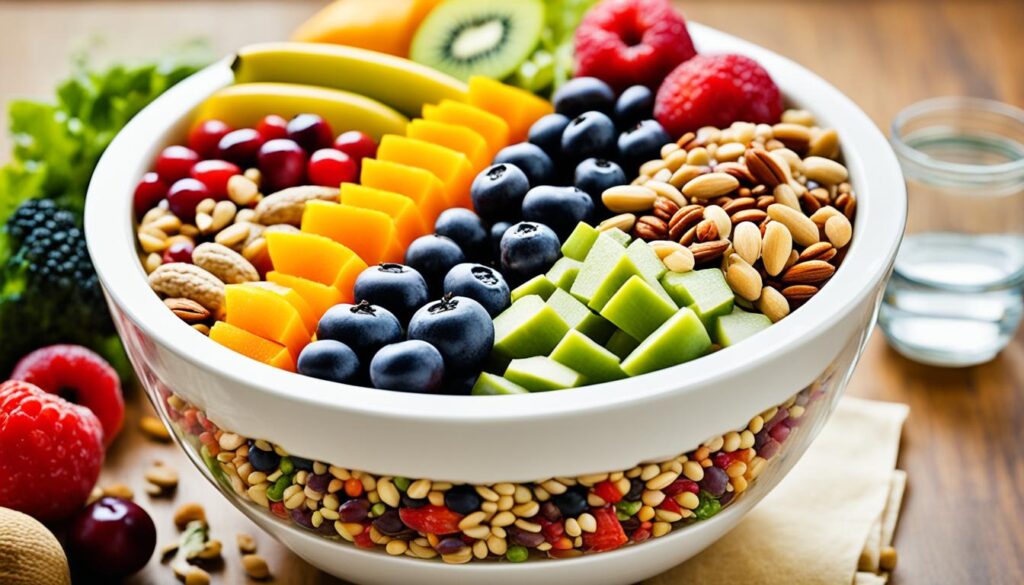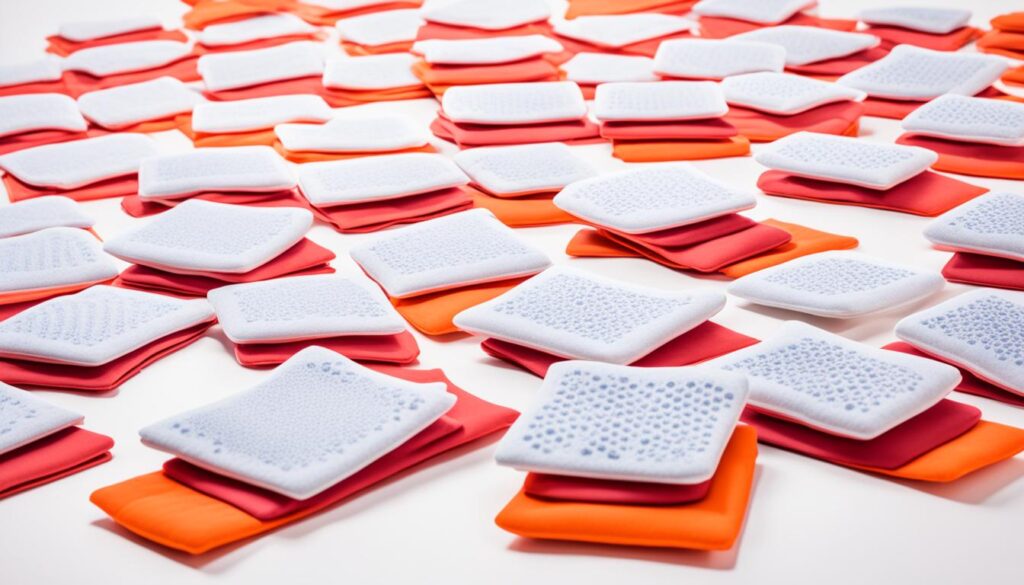Hello, I’m here to provide you with effective strategies and expert advice to help manage and alleviate your diverticulitis pain. Whether you’re seeking relief in India, this article will guide you towards finding the right solutions for your needs.
Table of Contents
ToggleDiverticulitis is an inflammatory condition of the digestive tract that can cause discomfort and disrupt your daily life. But don’t worry, there are proven methods to ease your symptoms and improve your overall well-being.
In this article, we will explore a range of approaches, including dietary modifications, home remedies, and lifestyle changes, that can help you find relief from diverticulitis pain. From understanding the symptoms and complications to incorporating What Is The Best Diet For Diverticulitis, and Foods To Avoid With Diverticulitis we’ve got you covered.
To provide you with the most accurate and up-to-date information, our expert tips are tailored specifically for individuals like you who are seeking relief in India.
So, let’s dive in and discover effective strategies that can help you manage your diverticulitis pain so you can get back to enjoying life to the fullest.
Understanding Diverticulitis and its Symptoms
Diverticulitis is a condition that occurs when small pouches, known as diverticula, become inflamed or infected in the digestive tract. These diverticula are formed in the walls of the large intestine and are often referred to as diverticulosis.
When the pouches become inflamed, they can cause various symptoms, including:
- Abdominal pain or tenderness, usually on the left side
- Bloating and gas
- Changes in bowel habits, such as diarrhea or constipation
- Fever and chills
If left untreated, diverticulitis can lead to complications such as:
- Abscesses (pus-filled pockets)
- Fistulas (abnormal connections between organs or tissues)
- Perforations (tears or holes in the intestinal wall)
If you experience severe abdominal pain, rectal bleeding, persistent fever, or any worsening symptoms, it is essential to seek medical attention immediately.

| Symptoms of Diverticulitis | Potential Complications |
|---|---|
|
|
Home Remedies for Diverticulitis
When it comes to managing diverticulitis, some people find relief through specific eating patterns and home remedies. These remedies include:
- Low Fiber Diet: Following a low fiber diet can help ease symptoms. This involves consuming cooked or canned fruits and vegetables, eggs, dairy products, and low fiber cereals. Here is an example of a low fiber diet meal plan:
| Meal | Food Choices |
|---|---|
| Breakfast | Scrambled eggs with low fiber white bread |
| Lunch | White rice with cooked vegetables and yogurt |
| Dinner | Pasta with lean meat sauce and canned fruit |
- Liquid Diet: In some cases, a healthcare professional may recommend a temporary liquid diet. This involves consuming clear broths, fruit juices without pulp, gelatin, and popsicles. It allows the digestive system to rest and heal.
- Vitamin D: Increasing vitamin D intake can have potential benefits for diverticulitis. This can be done through food sources such as fatty fish, fortified milk, and eggs, or dietary supplements. Consult a healthcare professional before starting any supplementation regimen.
- Heat Pads: Applying heat pads to the affected area can help alleviate pain and discomfort. Heat pads increase blood flow and relax the muscles. Here is an example of a heat pad that can be used on the abdomen:
- Probiotics: Trying probiotics may provide relief for some individuals. Probiotics contain beneficial species of gut bacteria that can help restore the balance of the digestive system. They can be consumed as supplements or through fermented foods such as yogurt, sauerkraut, and kimchi. Start with small amounts and monitor individual tolerance.
- Physical Activity: Staying physically active can help manage diverticulitis pain. Engaging in regular exercise releases endorphins, which act as natural pain relievers in the body. It also has anti-inflammatory effects and can help prevent constipation. Aim for at least 2.5 hours of moderate-intensity physical activity per week.
- Herbs and Spices: Some herbs and spices are known for their anti-inflammatory properties and can potentially provide relief. Examples include garlic, turmeric, ginger, and green tea. However, it is essential to consult with a healthcare professional before trying any new herbal remedies, as they may interact with medications.
By incorporating these home remedies into your routine, you may find relief from diverticulitis pain and promote overall digestive health.
Importance of Fiber in Diverticulitis Management
Consuming an adequate amount of fiber plays a crucial role in managing diverticulitis. Research has shown that a low-fiber diet may contribute to the development of diverticulosis, the condition in which diverticula, or small pouches, form in the digestive tract. By incorporating high-fiber foods into your diet, you can reduce inflammation and promote digestive health, ultimately managing diverticulosis symptoms effectively.
It is recommended that adults consume between 20 and 30 grams of fiber per day to support optimal digestive function. Fiber can be classified into two types: soluble fiber and insoluble fiber.
Soluble Fiber
Soluble fiber, as the name suggests, dissolves in water and forms a gel-like substance in the digestive tract. This type of fiber can help soften stools, making them easier to pass and preventing constipation. Good sources of soluble fiber include:
- Fruits such as apples and berries
- Vegetables like avocados and broccoli
- Legumes such as beans
Insoluble Fiber
Insoluble fiber, on the other hand, does not dissolve in water and adds bulk to the stool. It helps promote regularity by moving waste through the digestive system. Including foods rich in insoluble fiber in your diet can help prevent constipation and maintain bowel regularity. Some examples of insoluble fiber sources are:
- Whole grains like oats and brown rice
- Nuts and seeds
- Cruciferous vegetables such as cabbage and Brussels sprouts
Incorporating high-fiber foods into your diet can reduce inflammation, promote regular bowel movements, and alleviate symptoms associated with diverticulitis. It is important to experiment with different fiber sources to find what works best for you and your individual symptoms. Remember to increase your fiber intake gradually and drink plenty of water to avoid any potential digestive discomfort.

By prioritizing fiber-rich foods, such as fruits, vegetables, legumes, whole grains, nuts, and seeds, you can effectively manage diverticulitis and improve your overall digestive health.
The Role of Vitamin D in Diverticulitis
Research suggests a possible link between vitamin D deficiency and increased risk of diverticulitis. Vitamin D plays an essential role in maintaining bone health and supporting the immune system, making it important for overall well-being.
Vitamin D can be obtained through two primary sources: food and sunlight exposure.
When it comes to food sources of vitamin D, options include:
- Fatty fish, such as salmon and trout
- Beef liver
- Eggs
- Cheese
- Mushrooms
In addition, some foods are fortified with vitamin D, such as milk, cereals, and orange juice.
Sunlight exposure is also crucial as the skin produces vitamin D when exposed to ultraviolet (UV) light. Spending time outdoors, particularly during midday when the sun’s rays are most intense, can help boost vitamin D levels.
In cases where vitamin D levels are low, dietary supplements may be recommended. These supplements usually come in the forms of vitamin D2 and D3. However, it’s important to consult with a healthcare professional before starting any supplementation regimen to determine the appropriate dosage and ensure it is safe for you.

Now let’s take a closer look at the potential benefits of maintaining adequate vitamin D levels and the recommended daily allowance.
Finding Relief with Heat Pads
When experiencing painful stomach cramps caused by diverticulitis, heat pads can provide much-needed relief. Heat pads work by increasing blood flow and relaxing the muscles in the affected area. There are different types of heat pads available, each offering unique benefits. Let’s explore some popular options:
Electric Heat Pads
Electric heat pads are a convenient choice as they can be easily plugged into an electrical outlet. These pads have adjustable settings to control the level of heat, allowing for personalized comfort. It is important to carefully read and follow the manufacturer’s instructions to avoid any potential risks.
Microwaveable Heat Pads
Microwaveable heat pads are another popular option for relieving stomach cramps. These pads are designed to be heated in the microwave and retain their warmth for a significant period of time. They are portable and can be used anywhere, making them an ideal choice for individuals on the go.
Hot Water Bottles
A classic remedy, hot water bottles are simple yet effective for easing stomach cramps. These bottles are filled with hot water and have a rubber or fabric cover to protect against burns. It is important to handle hot water bottles with caution and ensure they are securely sealed to prevent leaks.
Regardless of the type of heat pad you choose, it is crucial to use them with caution to prevent burns. Always follow the instructions provided by the manufacturer and avoid prolonged exposure to excessive heat.
Heat pads offer several benefits for individuals experiencing stomach cramps due to diverticulitis:
- Alleviate pain and discomfort
- Relax the muscles in the affected area
- Increase blood flow to promote healing

Remember, while heat pads can provide temporary relief, it is essential to consult with a healthcare professional for a comprehensive treatment plan tailored to your specific needs. Heat pads should be used as a complementary therapy alongside medical advice to effectively manage diverticulitis symptoms.
Exploring the Potential of Probiotics
Probiotics have gained recognition for their potential benefits in improving digestive health and reducing symptoms of various gastrointestinal conditions. In the case of diverticulitis, probiotics show promise in helping to alleviate symptoms and prevent recurrence.
Probiotics are live microorganisms that, when consumed in adequate amounts, provide health benefits to the host. These beneficial bacteria can help restore the balance of gut bacteria, which may be disrupted in individuals with diverticulitis.
While more research is needed to fully establish the effectiveness of probiotics as a treatment for diverticulitis, preliminary studies suggest that they may help reduce inflammation and improve symptoms. However, the specific strains and dosages of probiotics that are most beneficial for diverticulitis management are still being investigated.
Probiotics can be obtained through supplements or by consuming fermented foods. Some commonly used strains include lactobacillus and bifidobacterium species. Fermented foods, such as yogurt, sauerkraut, and kimchi, also contain naturally occurring probiotics.
It is important to note that probiotics may not be suitable for everyone, and individual tolerances can vary. Some people may experience side effects such as gas, bloating, or diarrhea when initially introducing probiotics into their diet. It is recommended to start with small amounts and gradually increase consumption while monitoring any changes in symptoms.
Ultimately, consulting with a healthcare professional is advisable before starting probiotic supplementation or significantly changing the diet. They can provide personalized guidance based on an individual’s specific condition and medical history.
Potential Benefits of Probiotics for Diverticulitis:
- Restoration of healthy gut bacteria balance
- Reduction of inflammation
- Possible improvement in symptoms
Important Considerations:
- Probiotics are available as supplements or can be obtained from fermented foods
- Start with small amounts and monitor individual tolerance
- Consult a healthcare professional before making significant changes to the diet
The Importance of Physical Activity
Regular physical activity is essential for managing diverticulitis pain effectively. Engaging in exercise releases endorphins, which are natural pain relievers in the body. Additionally, physical activity has anti-inflammatory effects and can help prevent constipation, which is a common symptom of diverticulitis. To maintain a healthy lifestyle, it is important to follow the recommended guidelines for physical activity.
The Physical Activity Guidelines for Americans suggest at least 2.5 hours of moderate-intensity physical activity per week. This can include various activities such as:
- Brisk walking
- Dancing
- Gardening
- Cycling
By incorporating these activities into your routine, you can improve not only your digestive health but also your overall well-being.
Engaging in physical activity regularly helps alleviate diverticulitis pain by releasing endorphins, which act as natural pain relievers. These endorphins promote a sense of well-being and can significantly reduce discomfort. Moreover, physical activity has anti-inflammatory effects, which can help reduce the inflammation associated with diverticulitis. It also aids in preventing constipation, a common symptom of the condition.
| Benefits of Physical Activity for Diverticulitis | Recommended Guidelines |
|---|---|
| Release of endorphins | 2.5 hours of moderate-intensity physical activity per week |
| Anti-inflammatory effects | Activities such as brisk walking, dancing, gardening, and cycling |
| Prevention of constipation |
By following these guidelines and engaging in regular physical activity, you can effectively manage diverticulitis pain and improve your overall quality of life.
Exploring Herbal Remedies for Diverticulitis
When it comes to managing diverticulitis, some individuals may find relief from incorporating various herbs and spices into their diet. These natural ingredients are known for their potential anti-inflammatory and antimicrobial properties, which can help alleviate symptoms and promote overall digestive health.
Examples of herbs and spices that have been associated with potential benefits for diverticulitis include:
- Garlic: Known for its antimicrobial properties, garlic may help reduce inflammation in the digestive tract.
- Turmeric: Curcumin, the active compound in turmeric, has powerful anti-inflammatory effects that may provide relief from diverticulitis symptoms.
- Ginger: Ginger is believed to have anti-inflammatory properties that can help soothe the digestive system and alleviate pain.
- Green tea: This antioxidant-rich beverage contains compounds that have been shown to have anti-inflammatory properties and may support digestive health.
While these herbal remedies show promise, it’s important to note that their effectiveness in treating diverticulitis is not yet well-established. To ensure your safety and avoid potential interactions with medications, it is essential to consult with a healthcare professional before incorporating any new herbal remedies into your routine. Additionally, each individual may have different tolerance levels for herbs and spices, so it’s crucial to monitor your body’s response and adjust accordingly.
In some cases, certain herbs and spices may be high in fermentable compounds, which can cause digestive symptoms in certain individuals. Therefore, it’s important to be mindful of your body’s reaction and make adjustments as needed.
Conclusion
Managing diverticulitis pain involves a combination of strategies to find relief and improve overall digestive health. This includes making dietary modifications, utilizing home remedies, and implementing lifestyle changes. It is crucial to work closely with a healthcare professional to develop a personalized plan that caters to individual needs and preferences.
While home remedies can provide temporary relief, it is important to seek medical attention if symptoms worsen or if there are signs of complications. A healthcare professional can evaluate the severity of the condition and provide appropriate treatment options. Diverticulitis, if left untreated, can lead to serious complications such as abscesses or perforations, so it is crucial to address it in a timely manner.
With proper management and adherence to the prescribed plan, individuals can find relief from diverticulitis pain and improve their overall digestive health. By incorporating dietary modifications, such as consuming a high-fiber diet and staying hydrated, individuals can promote regular bowel movements and reduce inflammation in the digestive tract. Implementing lifestyle changes, such as staying physically active and managing stress levels, can also contribute to better overall health.
Remember, each person’s journey with diverticulitis may be unique, and what works for one individual may not necessarily work for another. Therefore, it is important to consult with a healthcare professional and monitor the effectiveness of the strategies implemented. With the right approach, individuals can find relief, manage diverticulitis pain, and lead a healthy and fulfilling life.
FAQ
What is diverticulitis?
Diverticulitis is an inflammatory condition of the digestive tract that can cause pain and discomfort. It is characterized by small pouches called diverticula that can form in the large intestine. When these pouches become inflamed or infected, it leads to diverticulitis.
What are the symptoms of diverticulitis?
Common symptoms of diverticulitis include abdominal pain, bloating, changes in bowel habits, and fever. In some cases, diverticulitis can lead to complications such as abscesses, fistulas, or perforations. It is important to seek medical attention if symptoms worsen or if there is rectal bleeding or severe abdominal pain.
How can I manage diverticulitis at home?
Some people find relief from diverticulitis symptoms by following specific eating patterns or using home remedies. These remedies include a low fiber diet, a temporary liquid diet, increasing vitamin D intake, applying heat pads, trying probiotics, staying physically active, and consuming herbs and spices with anti-inflammatory properties.
How much fiber should I consume to manage diverticulitis?
It is recommended that adults consume between 20 and 30 grams of fiber per day to manage diverticulitis. High-fiber foods such as apples, avocados, beans, berries, broccoli, nuts, and whole grains are beneficial in reducing inflammation and promoting digestive health.
Is there a link between vitamin D and diverticulitis?
Some research suggests a possible link between lower vitamin D levels and increased risk of diverticulitis. Food sources of vitamin D include fatty fish, beef liver, eggs, cheese, mushrooms, and fortified foods. Sunlight exposure is also important as the skin converts UV light into vitamin D. In cases where vitamin D levels are low, dietary supplements in the forms of D2 and D3 may be recommended, but it is important to consult with a healthcare professional before starting any supplementation regimen.
How can heat pads help with diverticulitis pain?
Heat pads can provide relief for painful stomach cramps caused by diverticulitis. They work by increasing blood flow and relaxing the muscles in the affected area. Electric heat pads, microwaveable heat pads, and hot water bottles are different types of heat pads available. It is important to use these devices with caution and follow instructions to prevent burns.
Can probiotics help with diverticulitis?
Probiotics, which contain beneficial species of gut bacteria, show potential in reducing symptoms and recurrence of diverticulitis. Probiotics can be consumed as supplements or through fermented foods such as yogurt, sauerkraut, and kimchi. It is important to start with small amounts and monitor individual tolerance, as some people may experience side effects such as gas, bloating, or diarrhea.
How does physical activity help with diverticulitis?
Staying physically active through regular exercise can help alleviate diverticulitis pain. Physical activity releases endorphins, which are natural pain relievers in the body. It also has anti-inflammatory effects and can help prevent constipation. The Physical Activity Guidelines for Americans recommend at least 2.5 hours of moderate-intensity physical activity per week.
Are there any herbal remedies for diverticulitis?
Some herbs and spices, such as garlic, turmeric, ginger, and green tea, are known for their anti-inflammatory or antimicrobial properties, which may benefit individuals with diverticulitis. However, the effectiveness of these remedies for diverticulitis is not yet well-established. It is important to consult with a healthcare professional before trying any new herbal remedies, as they may interact with medications and have individual tolerance levels.
About The Author

Medically reviewed by Dr. Nivedita Pandey, MD, DM (Gastroenterology)
Senior Gastroenterologist & Hepatologist
Dr. Nivedita Pandey is a U.S.-trained gastroenterologist and hepatologist with extensive experience in diagnosing and treating liver diseases and gastrointestinal disorders. She specializes in liver enzyme abnormalities, fatty liver disease, hepatitis, cirrhosis, and digestive health.
All content is reviewed for medical accuracy and aligned with current clinical guidelines.
About Author | Instagram | Linkedin





